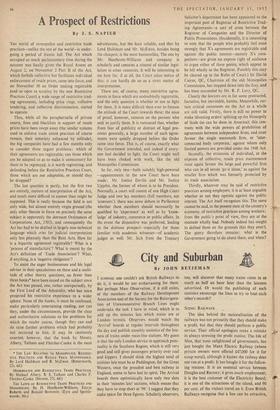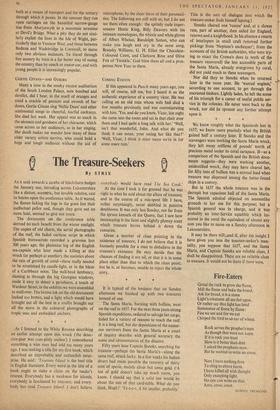City and Suburban
By JOHN B ETJEMAN I SUPPOSE one couldn't ask British Railways to do it, it would be too embarrassing for them. But perhaps Mass Observation, if it still exists, or the members of the Railway Development Association and of the Society for the Reinvigora- tion of Unremunerative Branch Lines might undertake the task I have in mind, which is to add up the minutes late, which trains are at London termini. Observers would watch the 'Arrival' boards at regular intervals throughout the day and publish monthly statistics of the late- ness of trains under main-line stations. My guess is that the only London service to approach punc- tuality is the Southern Region, which is still very good and still gives passengers priority over coal and kippers. I should think the highest total of minutes late must be at Paddington, for the Great Western, once the proudest and best railway in England, seems to have lost its spirit. The Arrival boards there optimistically have only two slots in their 'minutes late' sections, which means that they have to stop short at '99.' I suggest that they make space for three figures. Scholarly observers, too, will discover that many trains come in as much as half an hour later than the lateness advertised. Or would the publishing of such statistics encourage the lines to try to beat each other's records?
SCENIC RAILWAYS The idea behind the nationalisation of the railways was not primarily that they should make a profit, but that they should perform a public service. Their official apologists make a mistake in always stressing the profit motive. The Isle of Man, that most enlightened of governments, has just bought the Manx Electric Railway (whose private owners were offered £47,000 for it for scrap metal), although it knows the railway does not run at a profit. It has bought it for the follow- ing reasons. It is an essential service between Douglas and Ramsey; it gives much employment; it is the best customer of the Electricity Board; it is one of the attractions of the island, and 90 per cent. of the visitors travel on it. Even British Railways recognise that a line can be attractive, both as a means of transport and for the scenery through which it passes. In the summer they run open carriages on the beautiful narrow-gauge line from Aberystwyth to a mountain terminus at Devil's Bridge. What a pity they do not simi- larly exploit the lines in the Isle of Wight, par- ticularly that to Ventnor West, and those between Bodmin and Wadebridgc in Cornwall, to name only two obvious instances. To travel through fine scenery by train is a far better way of seeing, the country than by coach or motor-car, and with young people it is increasingly popular.
GERM GITANA—AND Chinas Many a time in the smoky rococo auditorium of the South London Palace, now bombed and derelict, did I hear, in the smell of oranges and amid a crackle of peanuts and swoosh of bar doors, Gertie Gitana sing 'Nellie Dean' and other sentimental songs to cheerful, tearful cockneys. She died last week. Her appeal was as much in the niceness and goodness of her character, which came across to her audiences, as in her singing. Her death makes me wonder how many of these older variety artists survive, who could hold a huge and tough audience without the aid of microphone, by the sheer force of their personali- ties. The following are still with us, but I do not see them often enough : the spritely male imper- sonator Hettie King, Billy Danvers with his intimate monologues, the whistle and white gloves of Albert Whelan, Randolph Sutton, who can make you laugh and cry in the same song, Bransby Williams, G. H. Elliot the Chocolate- Coloured Coon, and Clarkson Rose and Olive Fox of 'Twinkle.' God bless them all and a pros- perous New Year to them.
COMING EVENTS If this appeared in Punch many years ago, you will, of course, tell me, but I heard it as the authentic experience of a country vicar. He was calling on an old man whose wife had died 'a few months previously and was commiserating with him. 'Yes, and do you know, Vicar, last night she came into the room and sat in that chair over there and I had quite a long talk with her."Well, isn't that wonderful, John. And what do you think it can mean, your seeing her like that?' 'Well, Vicar, I think it must mean we're in for some more rain.'



































 Previous page
Previous page